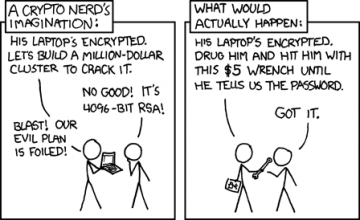How much time is needed to crack a password by brute-force?
If the password cannot be guessed and is not found in a dictionary, the cracker has to try a brute-force attack. When brute-forcing, the time to crack the password depends on the amount of possible passwords that the cracker has to try. The amount of possible passwords increases with password length and with increasing diversity of characters being used (complexity).
Let’s take the scenario of a cracker trying 15 million passwords per second. This is currently the maximum speed being claimed by password cracker vendors. You need a pretty fast computer to achieve this. The following table shows the computed time to crack a password with 15 million tries per second. Notice the incredible increase in time to try all possible combinations when password length and complexity increase.
length: 4, complexity: a-z ==> less than 1 second
length: 4, complexity: a-zA-Z0-9 + symbols ==> 4.8 seconds
length: 5, complexity: a-zA-Z ==> 25 seconds
length: 6, complexity: a-zA-Z0-9 ==> 1 hour
length: 6, complexity: a-zA-Z0-9 + symbols ==> 11 hours
length: 7, complexity: a-zA-Z0-9 + symbols ==> 6 weeks
length: 8, complexity: a-zA-Z0-9 ==> 5 months
length: 8, complexity: a-zA-Z0-9 + symbols ==> 10 years
length: 9, complexity: a-zA-Z0-9 + symbols ==> 1000 years
length: 10, complexity: a-zA-Z0-9 ==> 1700 years
length: 10, complexity: a-zA-Z0-9 + symbols ==> 91800 years
What we see is that:
* any password shorter than 5 characters can be cracked within 5 seconds
* any password shorter than 7 characters can be cracked within a day.
* With the password length of 9, the cracking time goes to hundreds of years. In most cases this can be considered acceptable while mostly we need to keep a secret for a maximum of 30 years.
To be on the safe side, we recommend a minimum password length of 10 characters.



